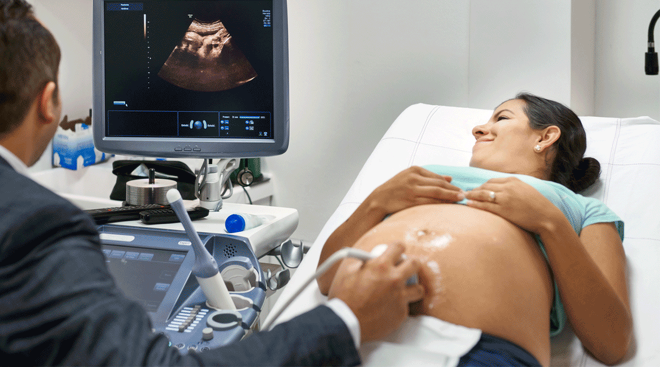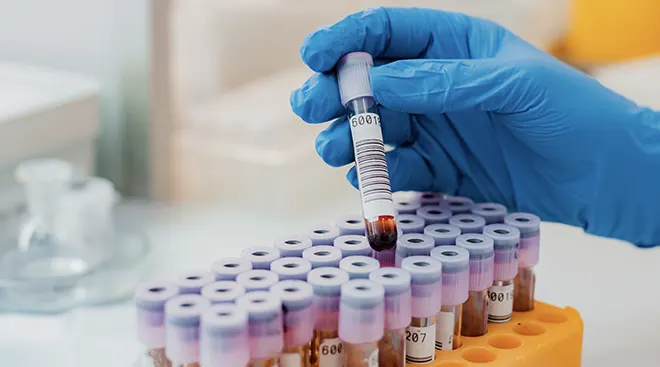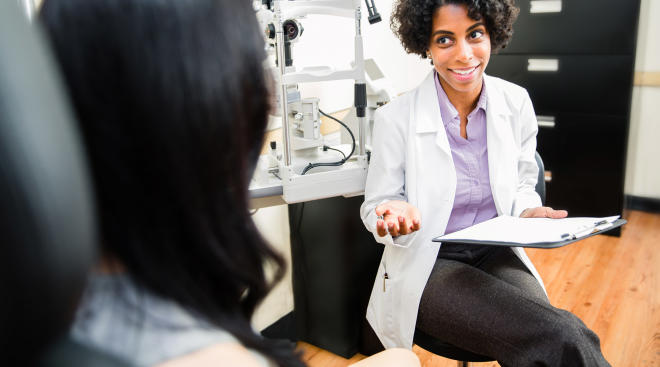Your Guide to Genetic Testing During Pregnancy
You get used to being poked and prodded when you’re expecting. There’s no shortage of tests to make sure everything is going as planned with you and baby. At some point, you’ll likely hear about different prenatal genetic screening and diagnostic test options available. It can be overwhelming and confusing, to say the least. So exactly what is genetic testing in pregnancy, and what does it entail? Moreover, what conditions and diseases can be detected? Ready to crack the code on prenatal genetic testing? From how procedures are performed to what they cost, here’s everything you need to know.
Genetic testing during pregnancy offers insight into whether or not there is a risk of baby having a genetic disorder. There are a few types of genetic test options available, and each offers different information.
Prenatal genetic testing vs. preconception genetic testing
Prenatal genetic testing and preconception genetic testing can be tough to differentiate, since they both take place before baby is born. But preconception genetic testing, often called a carrier screening, is done before a baby is even conceived.
Carrier screenings look at the parents to determine if they are carriers of certain genetic disorders, according to the American College of Obstetricians and Gynecologists (ACOG). This information can help doctors assess a couple’s risk of having a baby with a genetic disorder if and when they get pregnant. Prenatal genetic tests, on the other hand, are done after baby has been conceived; these screenings assess baby’s genetic makeup.
Prenatal genetic testing is an umbrella term that covers both genetic screening tests and genetic diagnostic tests. While both types of tests are looking for certain genetic markers, they’re quite different in how they’re performed as well as what the results mean.
Genetic screening tests
There are a few different types of tests that can be done at various points during pregnancy. So what’s the first step in genetic testing during pregnancy? The process starts with a genetic screening test. Kristin PaulysonNuñez, MS, CGC, a genetic counselor at Duke Health in Durham, North Carolina, explains that screening tests “provide an assessment of risk” of a genetic disorder, but “they don’t provide diagnostic information about the health or well-being of the baby.” In other words, they can indicate the likelihood of a disorder, but can’t say for sure whether one exists.
Results for these tests can be somewhat confusing, says Emily Hardisty, MS, CGC, a genetic counselor at the University of North Carolina in Chapel Hill, North Carolina. “While the terminology of ‘positive’ or ‘negative’ is often used on genetic screening reports, it would be much more appropriate for these to read ‘increased risk’, followed by a probability, or ‘decreased risk’, followed by a probability.” Essentially, the results of these tests are not definitive, but they can help parents decide if they’d like to undergo further testing for more conclusive answers.
Prenatal genetic screening test options include:
-
First trimester screening. According to the ACOG, this is performed between 10 and 13 weeks of pregnancy, and includes a blood test and a nuchal translucency screening ultrasound. Results of both of these tests are combined to screen for risk of Down syndrome, other chromosomal abnormalities or possible defects of the heart, and skeleton and/or abdominal wall.
-
Second trimester screening. This is another two-part test that includes a blood test and ultrasound. The blood test can be done between 15 and 22 weeks of pregnancy and screens for risk of Down syndrome, Edwards syndrome and neural tube defects (NTD). The ultrasound is performed between weeks 18 and 22 of pregnancy and checks for anatomy defects in baby’s limbs, heart, brain, spine, abdomen and facial features.
-
Combined first and second trimester screening. According to the journal Understanding Genetics, this is sometimes called an “integrated” screening; it’s when the results of all four screening tests are combined with factors, such as a mom’s age and weight, to provide slightly more accurate screening results (though, this test still measures baby’s risk of genetic disorders; it’s not diagnostic). Since it combines first and second trimester tests, results for a combined screening aren’t available until 18 to 22 weeks of pregnancy.
-
Cell-free DNA testing. Often referred to as noninvasive prenatal testing (NIPT), this is a blood test that can be performed as early as 10 weeks of pregnancy. It pulls baby’s DNA from the mom’s blood and tests for Down syndrome, Patau syndrome, Edwards syndrome, chromosomal abnormalities and sex chromosome abnormalities (and, yes, this means can find out baby’s sex with this test too.).
Again, it’s important to remember that these screenings only give parents an idea of baby’s risk of having these genetic disorders, there is no certainty in a “positive” or “negative” result. At this point, parents can opt to take their results and be done with genetic testing—or they have the option to move forward with diagnostic genetic testing.
Diagnostic genetic tests
According to Hardisty, “a diagnostic test is a direct test of the cells from the pregnancy and can determine with a high level of accuracy whether a pregnancy is affected by a genetic condition.”
The accuracy isn’t the only thing that’s different about diagnostic tests, though; the procedures themselves are more invasive than prenatal genetic screenings. Also, unlike screenings, which are performed at a normal prenatal checkup, diagnostic tests are performed by a specialist, often outside of your ob-gyn practice.
There are two methods of diagnostic genetic testing, and they both carry a small risk of miscarriage. “[This] is why many people start with screening tests and move on to diagnostic testing if those results are concerning,” explains Hardisty. The test options are:
-
Amniocentesis. This type of diagnostic test can be performed any time after the 15-week mark of pregnancy, and it has a 99.9 percent accuracy rate of determining whether or not baby has a chromosomal genetic condition, such as Down syndrome. According to the American Pregnancy Association, this method can also be used to test for neural tube defects, such as spina bifida, and genetic disorders like cystic fibrosis. It’s performed by inserting a thin needle through the mom’s abdomen into the amniotic sac to collect a fluid sample. This procedure has less than a 1 percent risk of miscarriage.
-
Chorionic villus sampling (CVS). As noted by ACOG, this procedure is usually performed between 10 and 13 weeks of pregnancy; it involves inserting a thin needle through the abdomen area or inserting a catheter through the cervix in order to collect a small tissue sample from the placenta, according to Understanding Genetics. The sample is then analyzed for chromosomal conditions, such as Down syndrome, or specific genetic tests, and has about a 99 percent accuracy rate; it carries about a 1 percent chance of miscarriage.
The cost of prenatal genetic testing depends on the type of test and whether or not insurance will cover it. According to the National Library of Medicine, in general, genetic tests can cost anywhere from $100 to more than $2,000. The somewhat reassuring news is that insurance often covers some—if not all—of the cost when the test is recommended by a doctor or specialist.
Do you have to do genetic testing during pregnancy? Both Paulyson Nuñez and Hardisty stress that prenatal genetic screening tests and diagnostic tests are optional at every step. “It’s recommended that all expecting parents be made aware of their testing options during pregnancy,” says Hardisty. “[But] genetic testing is optional and is never required.” Since these tests aren’t mandatory, the decision on whether or not to move forward with them is entirely up to you. Some pros and cons to consider include:
Pros:
- Results showing a low risk of genetic disorders can provide peace of mind.
- In the case of a positive diagnosis, parents have time to cope with the news before jumping into caring for their newborn.
- Early diagnosis gives parents time to learn how to support their child and make necessary arrangements at home for baby’s needs.
- In some cases, parents are given the option to medically terminate the pregnancy.
Cons:
- Genetic screening tests assess risk; they do not diagnose.
- Genetic screening tests are not yet FDA-approved
- Genetic diagnostic tests are more invasive and carry a small risk of miscarriage.
In addition to weighing the pros and cons of prenatal genetic testing, Paulyson Nuñez recommends parents ask themselves the following questions:
- Does it serve me to go through the screening process?
- Am I willing to go through diagnostic testing?
- What information is important to me? What information do I need?
- What will I do with this information?
After deciding whether or not to move forward with prenatal genetic testing, parents should first talk to their ob-gyn or midwife. Since initial prenatal genetic screening tests are non-invasive, they’re usually performed during regular prenatal visits.
If you’d like to move forward with genetic diagnostic tests, you’ll need to see a specialist. To find one, ask your provider for a referral, or look for a qualified specialist nearby using the National Society of Genetic Counselors tool.
Genetic screening test results are typically available within one week, according to the National Library of Medicine, and your doctor will most likely call you with results. Prenatal genetic diagnostic test results typically take around two weeks (depending on the test); your genetic counselor will go over findings with you.
If a genetic diagnostic test comes back abnormal, Hardisty says that you’ll want to have an in-depth conversation with a genetic counselor about the diagnosis, outlook and further options. “Depending on the specific condition present and the family’s expressed goals, options that may be presented include prenatal or postnatal treatment, delivery at a hospital with pediatric specialists, meeting with subspecialty care providers, adoption, abortion and palliative care,” she says.
Genetic testing during pregnancy can potentially provide valuable information. But, ultimately, when it comes to prenatal genetic testing, doctors should offer you the information and support you need to make the best choice for your growing family.
About the experts:
Emily Hardisty, MS, CGC, is a board-certified genetic counselor and a clinical assistant professor of maternal fetal medicine at the University of North Carolina’s School of Medicine in Chapel Hill, North Carolina. She earned her master’s degree in genetic counseling from the University of South Carolina and has more than 20 years of clinical experience.
Kristin PaulysonNuñez, MS, CGC, is a board-certified genetic counselor with almost three decades of experience. She serves as the clinical team lead and senior genetic counselor within Women & Children’s Services and Duke’s Hemostasis and Thrombosis Center in Durham, North Carolina. A graduate of the genetic counseling program at Sarah Lawrence College, she completed her post-graduate work in teratology at Georgetown University.
Please note: The Bump and the materials and information it contains are not intended to, and do not constitute, medical or other health advice or diagnosis and should not be used as such. You should always consult with a qualified physician or health professional about your specific circumstances.
Plus, more from The Bump:
Navigate forward to interact with the calendar and select a date. Press the question mark key to get the keyboard shortcuts for changing dates.




















































